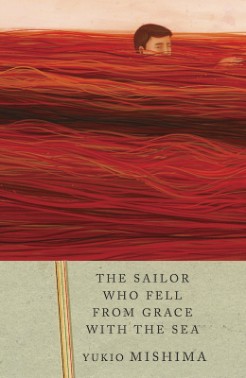“Sleep well, dear.”
Noboru’s mother closed his bedroom door and locked it. What would she do if there were a fire? Let him out first thing—she had promised herself that. But what if the wooden door warped in the heat or paint clogged the keyhole? The window? There was a gravel path below; besides, the second floor of this gangling house was hopelessly high.
It was all his own fault. It would never have happened if he hadn’t let the chief persuade him to sneak out of the house that night. There had been endless questions afterward, but he hadn’t revealed the chief’s name.
They lived at the top of Yado Hill in Yokohama, in a house his father had built. After the war the house had been requisitioned by the Occupation Army and toilets had been installed in each of the upstairs bedrooms: being locked in at night was no great discomfort, but to a thirteen-year-old the humiliation was enormous.
Left alone one morning to watch the house and in need of something to vent his spite on, Noboru began to rummage through his room.
A large chest of drawers was built into the wall adjoining his mother’s bedroom. He pulled out all the drawers, and as he was dumping their contents onto the floor he noticed a trickle of light spilling into one of the empty compartments of the chest.
He thrust his head into the space and discovered the source of the light: strong summer sunlight was reflecting off the sea into his mother’s empty bedroom. There was plenty of room in the chest. Even a grownup might squeeze in up to his belly if he lay flat. Peering at his mother’s bedroom through the peephole, Noboru sensed something new and fresh about it.
The shiny brass beds his father had ordered from New Orleans were set against the wall on the left side just as they had been before his death. A bedspread was smoothed neatly over one of them, and on the white cloth a large letter “K”—Kuroda was the family name. A blue straw sun hat, trailing a long pale-blue ribbon, lay on the bed. On the night table stood a blue electric fan.
Across the room, near the window, there was a dressing table fitted with an oval three-piece mirror. The mirror was not quite closed; the upper edges of the glass glinted through the cracks like splinters of ice. In front of the mirror rose a small city of bottles: eau de Cologne, perfume sprays, lavender toilet water, a Bohemian glass goblet, facets glittering in the light... a crumpled pair of brown-lace gloves lay withering like cedar leaves.
A couch and two chairs, a floor lamp, and a low, delicate table were arranged directly under the window. An embroidery frame, the beginnings of a pattern needled into the silk, was propped on the couch. The vogue for such things had passed long ago, but his mother loved all kinds of handicraft. The pattern seemed to be the wings of some gaudy bird, a parrot maybe, on a background of silver-gray. A pair of stockings lay in a heap next to the embroidery. The shocking embrace of sheer nylon and the imitation damask of the couch gave the room an air of agitation. She must have noticed a run on her way out and changed in a hurry.
Only dazzling sky and a few fragments of cloud, hard and glossy as enamel in the light bouncing off the water, could be seen through the window.
Noboru couldn’t believe he was looking at his mother’s bedroom; it might have belonged to a stranger.
